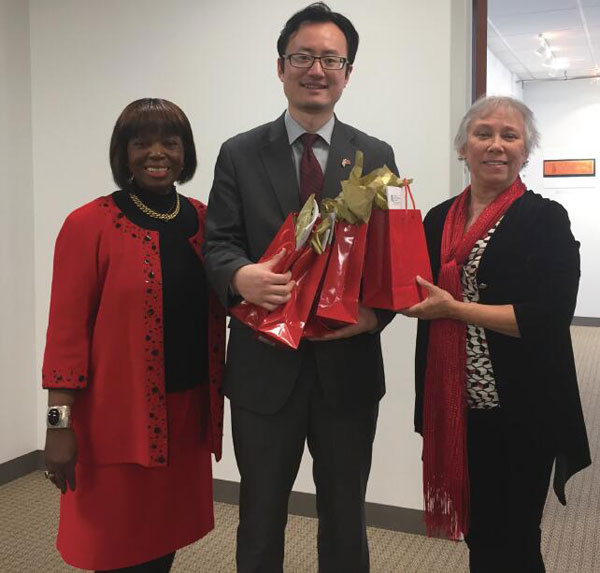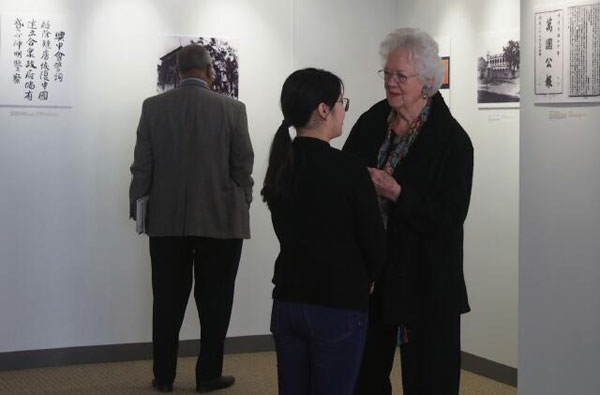China's forefather honored on 150th
 |
|
Diana Greer (right), president of the US-China Peoples Friendship Association, and Christine D. Brooks (left), president of the association’s DC chapter, present gifts to Gao Qing (center), director of the Confucius Institute US Center, at a celebration of Dr. Sun Yat-sen’s 150th birthday held on Saturday in Washington. PHOTOS BY YUAN YUAN / For China Daily |
As the forerunner of the democratic revolution in modern China and a lifelong friend of the US, Sun Yat-sen has long been commemorated by people in both countries.
This November marks Sun's 150th birthday, and celebrations were held all over China and in cities across the US, including Washington.
"The China-US relationship is not only about economics, trade and commerce," said Gao Qing, director of the Confucius Institute US Center, "but it's also about the friendship between people that has existed for a long time."
 |
|
Visitors inspect an exhibition of photographs of Sun Yat-sen, a forefather of the Chinese democratic revolution, Saturday morning at the Confucius Institute US Center in Washington. The exhibition was part of a celebration of Sun’s 150th birthday. |
The US-China Peoples Friendship Association (USCPF), Washington DC chapter, together with the Confucius Institute US Center, celebrated the occasion with a display of photographs from the Sun Yat-sen Museum Residence in Zhongshan city, Guangdong province.
"All of us here today recognize the contributions of the life of Dr. Sun Yat-sen, and we want to learn more about this remarkable person who forged long-lasting ties between China and the United States during his lifetime," said Diana Greer, president of the US-China Peoples Friendship Association.
His vision and legacy live on and will continue to live on, and his message of boai (universal love), is as timely today as it was back then, Greer said.
"We have this special exhibition of photos featuring his lifetime and we also have calligraphy originally done by Dr. Sun himself," Gao said. "The two characters he wrote — shensi — mean ‘think carefully'."
Zhongshan city was named after Sun, the city growing out of Xiangshan county, where Sun was born on Nov 12, 1866.
After receiving a few years of local elementary school education, at the age of 13, Sun moved to live with his older brother Sun Mei in Honolulu, Hawaii, where he quickly picked up English.
He returned home in 1883 and eventually earned a license as a medical doctor from the Hong Kong College of Medicine for Chinese in 1892.
"I guess he did not see many patients — he gave up medicine in response to a higher calling of fallen China's defeat in the Sino-Japanese War of 1894 to 1895," said Samuel Tinsing Mok, a former chief financial officer of the U.S. Department of Labor and the keynote speaker at the celebration. "Dr. Sun wanted to save the entire country rather than saving individual patients."
Sun felt that by exercising his political skills and ability to motivate people, he could save many more people than by curing them one by one as a doctor, Mok said.
"In 1894, he founded his first revolutionary organization, Xingzhonghui, which means making China great," he said. "Today, president-elect Donald Trump might have borrowed this from him."
Sun was elected provisional president of the new provisional government of the Republic of China in a meeting of representatives in 1911.
"The emergence of Dr. Sun Yat-sen's ideology came at a time when foreign powers crashed the ancient Chinese empire wide open," Mok said. "Perhaps no other revolutionary figure has influenced as many people as Dr. Sun Yat-sen. He is indeed the founding father of the Chinese nation."
Mok considers Sun the first true Chinese nationalist in the modern sense who sought to give his fellow countrymen a greater sense of dignity, human value and a faith in their own country's civilization.
"He believed China should not blindly imitate the West but should work out a democratic system suited to its own traditions and needs," he said.
Sun's chief legacy is known as the Sanmin Doctrine, or Three Principles of the People — nationalism, democracy and people's livelihood.
"Many have said that Sanmin actually represented the original essence of Western democracy and a blending of Confucian thought," Mok said.
Sun also emphasized the importance of international investment and technical cooperation, he said.
That cross-cultural cooperation he emphasized is also one of the goals of the US-China Peoples Friendship Association, according to Greer.
"USCPF works on peace and understanding between the people of China and the United States, and has been doing so since its incorporation in 1974 in California," Greer said.
The association recognizes that the friendship between the two countries and good relations between the two governments play a critical role in the Pacific basin and around the world, she said.
Yuan Yuan in Washington contributed to the story
















